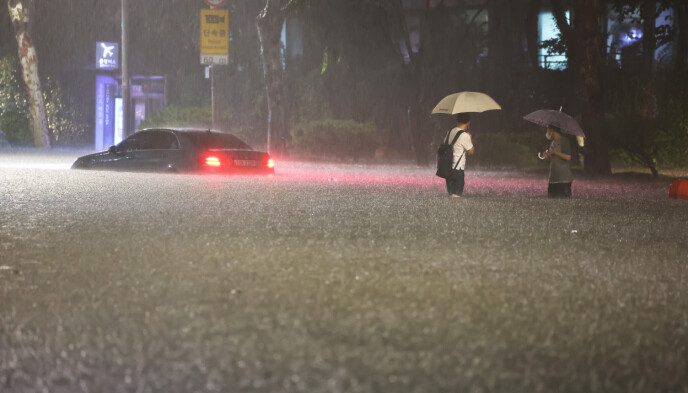Heat wave after heat wave has swept Europe this summer, and many countries are experiencing health-hazardous temperatures.
approx Half of Europe is affected by droughtAnd in mid-July, wildfires destroyed more areas than in all of 2021. Severe weather has also been reported in other parts of the world – such as Asia and the USA. In Death Valley, California, it rained so heavily recently that experts believe the amount of rain only comes once every 1,000 years. The guard writes.
Now experts fear for the future.
– We underestimate the risk of getting into a worst-case scenario, says Johann Rockström, director of the Potsdam Institute for Climate Research in Germany, Aftonbladet.

Forest fires: Large areas have been destroyed by wildfires so far this year as they have been in the whole of last year. Here from a forest fire in northeastern France in July. Photo: Reuters / NTB
Show more
– It’s hard to survive
During the 2015 Paris Climate Summit, countries around the world agreed to limit the rise in global temperature to “well below 2 degrees” – preferably 1.5 degrees. But now, seven years after the Paris Agreement was adopted, it may seem that the world is about to miss, with harsher weather, sea-level rise, wildfires and droughts as a result, Aftonbladet writes.
But the scenarios described are still very optimistic, according to a new climate study published in the Proceedings of the National Academy of Sciences.

Sounds the alarm: – Critical condition
– When we look closely at the climate models and the studies that have been done, we see that we are not likely to rise to three or four degrees. If we get to this point, it would be a planetary catastrophe, and an “endgame” for human civilization as we know it, says Rockstrom, one of the researchers behind the new study.
The climate scientist thinks it’s hard to say exactly how much warmth it should rise before human civilization collapses.
But at three degrees already, a third of the world’s population likely lives in areas where it is difficult to survive due to extreme heat and lack of food and water.

Sound the alarm about a new crisis
It might be too late
Norwegian climate researcher Bjorn Samset is also concerned about the development.
The climatic changes we are experiencing now are irreversible in the foreseeable future. He added that we have to live in a much hotter, wetter and wilderness – and it will only get worse daily newspaper last week.
So far, global warming is one degree. Samset believes that 2.5 degrees is the absolute maximum we can tolerate.
– We can limit ourselves to one and a half, too. It takes a lot, but it is possible. If we get to 2.5, it will be too late to lower it below 2 degrees again. He noted, however, that it would not be too late to stop emissions.

Floods: Many countries in Asia were affected by floods this summer. Here from South Korea, where at least eight people lost their lives as a result of this week’s flood. Photo: AP/NTB
Show more
urgent
Climate models today are based on the assumption that we do not cross the threshold, despite the fact that there is a significant risk that this is the case, Rockström explains.
Climate scientists believe it is urgent to control global greenhouse gas emissions, and they want the United Nations Climate Panel to take more action to achieve this.

hell on earth
The “play-off” is not on the table now, but we must gain a better knowledge of what can trigger it. Today, I’m very concerned as we are getting close to the point where we lose target by 1.5 degrees, he tells Aftonbladet.

“Organizer. Social media geek. General communicator. Bacon scholar. Proud pop culture trailblazer.”

